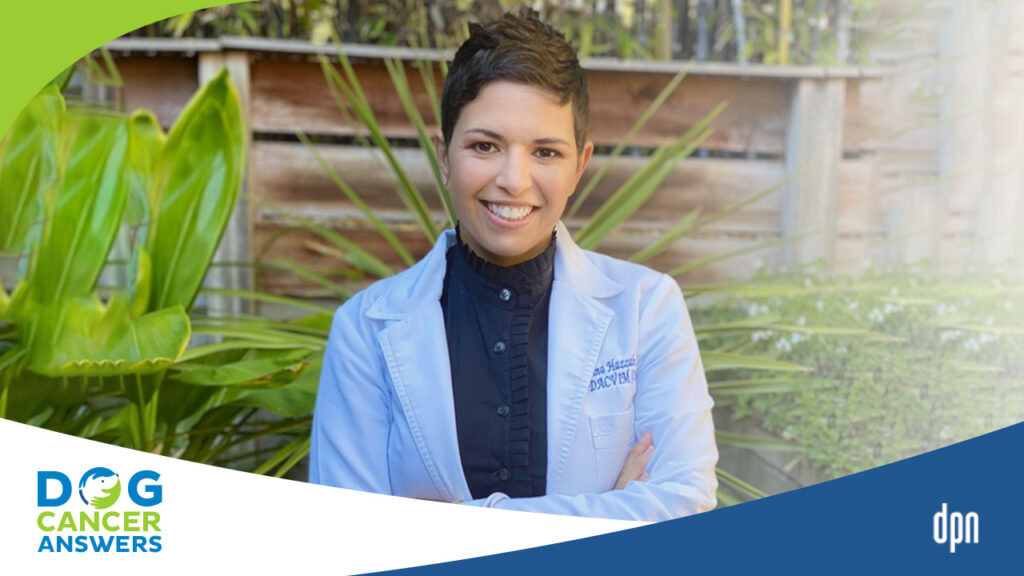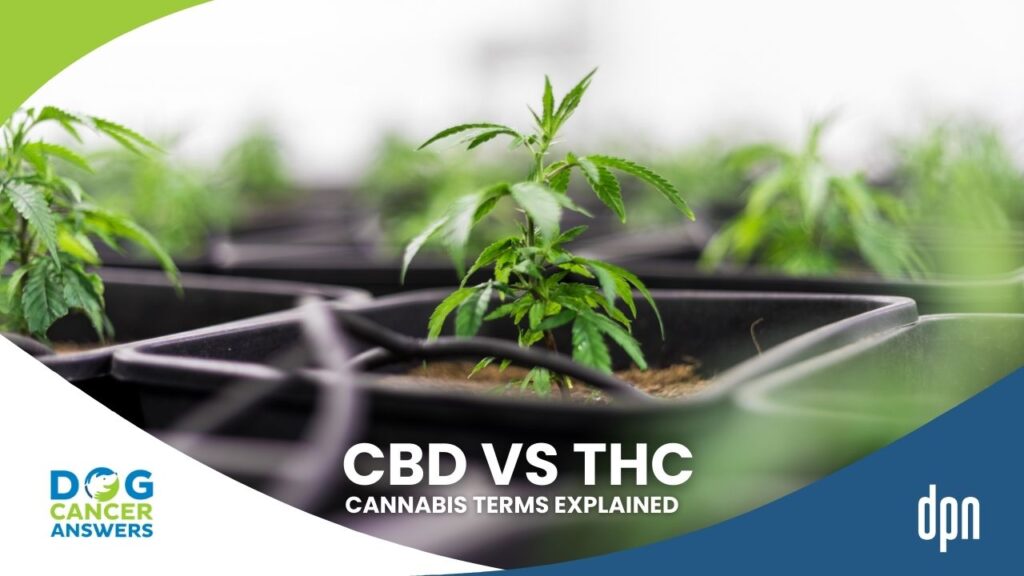EPISODE 70 | RELEASED July 24, 2020
Cannabis for Dogs with Cancer | Dr. Gary Richter Deep Dive
Do cannabis and CBD have benefits for dog cancer? Why doesn’t my vet recommend products? How do I know which are worth my money?
SHOW NOTES
Yes, there are benefits, for sure. But a thorny wall of legal, economic, and pharmaceutical complications make it harder for vets to share the growing knowledge. Dr. Gary Richter walks us through the benefits, hazards, and far-reaching implications of this uncharted territory. CBD has a future in veterinary medicine, but we’re not sure how close it is.
Links, Terms, and Resources Mentioned in Today’s Show:
Dr. Gary Richter’s websites:
Medications mentioned by name: Amoxycillin (an antibiotic), Epidiolex (for children with seizures)
Online cannabis consults for pet owners can be found here: https://www.veterinarycannabis.org/
The nonprofit Dr. Richter has formed with other veterinarians is called the Veterinary Cannabis Society, and their website will be located at https://veterinarycannabissociety.org
[00:00:00] >> Dr. Gary Richter: I think every pharmaceutical company probably has plans on the shelf to make cannabis based medicines, and what they’re waiting for is for the federal government to say, it’s okay.
[00:00:12] >> Announcer: Welcome to Dog Cancer Answers, where we help you help your dog with cancer. Here’s your host, James Jacobson.
[00:00:20] >> James Jacobson: Hi everyone, and welcome to the show.. Today, we venture into the territory of CBD for dogs. This promising field faces unique legal implications that often make it very difficult to even discuss. So we are lucky to have Dr. Gary Richter as our guest. He has an impressive resume. He was named holistic vet of the year for 2019 by the American Holistic Veterinary Association.
[00:00:48] He has been practicing veterinary medicine in the San Francisco Bay Area since 1998 and is now the owner and medical director of a vet practice called, appropriately enough, Holistic Veterinary Care. Dr. Richter is author of The Ultimate Pet Guide and is certified in veterinary acupuncture, chiropractic and Western herbology. Of importance for us today, he is a founding member of the Veterinary Cannabis Society, and he’s agreed to walk us through his perspective on CBD, something a lot of veterinarians will not do publicly on a podcast or even privately with their clients. Dr. Richter, thanks for being with us today.
[00:01:29] >> Dr. Gary Richter: Thank you.
[00:01:30] >> James Jacobson: You are in San Francisco, California.
[00:01:32] >> Dr. Gary Richter: I’m in Oakland. Close enough.
[00:01:33] >> James Jacobson: Oakland. Okay. So what I wanted to talk to you today about is something that you have more latitude to talk about in California than other parts of the country, which is specifically CBD and your use of it in veterinary medicine, because some veterinarians are very reluctant to talk about it.
[00:01:53] >> Dr. Gary Richter: Sure.
[00:01:53] >> James Jacobson: But you’re not. So first of all, why is that?
[00:01:56] >> Dr. Gary Richter: I think a lot of veterinarians are reluctant to talk about it for a couple of reasons. Probably the biggest one is there’s a real lack of clarity, as far as the legalities of all of this. For example, even here in California, the laws are kind of nuts. So as of January of this year, as a veterinarian, I can discuss with you as a pet owner, the use of medical marijuana.
[00:02:21] So like something that you would get from a dispensary to use for your pet. Technically speaking, I am not allowed to discuss the use of a hemp based CBD product that is available over the counter at the pet store. I am also not allowed to stock or sell hemp based CBD products that you can buy over the counter at the pet store.
[00:02:42] So even here in California, where, you know, things are quasi progressive in that regard, it’s a very, very sort of difficult landscape to navigate. And the other reason why I think veterinarians are also somewhat reticent to have this conversation with people is really just a lack of understanding of the endocannabinoid system and what cannabis does and what it can do and what the concerns are from a safety perspective.
[00:03:06] There’s just a lack of knowledge out there.
[00:03:09] >> James Jacobson: So let’s get into some of those details because I think our listeners who were especially interested in its applicability to dogs with cancer.
[00:03:16] >> Dr. Gary Richter: Yeah.
[00:03:16] >> James Jacobson: Are interested in that. And I guess let’s talk about safety issues and efficacy.
[00:03:21] >> Dr. Gary Richter: Okay. When it comes to cancer, there are no large, sort of, pharmaceutical type studies, when it comes to cannabis, and that is true, both for people and for animals. That said we do know from laboratory and preclinical studies, that many different components within cannabis have definitive anticancer properties, and that’s true for CBD. That’s true for THC. That’s true for a number of other ingredients that occur in cannabis.
[00:03:49] So, we know there’s anticancer activity there. And we also know just from the breadth of personal experience and case reports out there, in many cases on the human side, that there are certainly can be real benefits. And I think the real question that has yet to be answered as it pertains to cannabis is when we’re talking about treating cancer, what are the optimal formulations of cannabis? You know, some people are big proponents of CBD. Some people are proponents of using more THC than CBD. And to be honest with you, it’s probably very dependent on both the type of cancer and the individual in question. But yeah, it’s definitely not a one size fits all thing.
[00:04:35] >> James Jacobson: So can you discuss that a little bit about, because THC is obviously the constituent in marijuana that is hallucinogenic, right?
[00:04:45] >> Dr. Gary Richter: Correct.
[00:04:45] >> James Jacobson: And so what is the impact on a dog with dosing something that has the THC?
[00:04:50] >> Dr. Gary Richter: That’s a great question. So yes, dogs absolutely can be negative affected by THC and in some ways they can actually be affected more profoundly than humans can.
[00:05:02] That said, it is absolutely possible to put a dog on THC and have them not be high. Have them not have negative effects. As I often tell people, a stoned dog is never an acceptable side effect when it comes to medical cannabis in animals. And really the key there is exactly what it would be if I were gonna use any pharmaceutical in so much as the key to success is accurate dosing.
[00:05:30] And that’s really what it comes down to is knowing how much you can give, knowing how much is too much. And one of the things that we also know about cannabis when it comes to THC, which is really important, is that whether it’s a person or an animal, the individual will develop a tolerance to the psychoactive effects of THC over time, which means that if we slowly increase the dose over time, we can ultimately get to much higher and hopefully much more therapeutic doses of THC without there being problems.
[00:06:02] >> James Jacobson: So a stoned that dog is never a good outcome.
[00:06:04] >> Dr. Gary Richter: Correct.
[00:06:04] >> James Jacobson: And then you talked a little bit about the importance of dosing.
[00:06:09] >> Dr. Gary Richter: Uh huh.
[00:06:09] >> James Jacobson: Doesn’t that raise the question of like standardization and how do you know what the right amount of this is and how do you dose it in such a way that it’s consistent from client to client or from batch to batch?
[00:06:20] >> Dr. Gary Richter: Sure. So dosing, pharmaceuticals, or dosing medications in veterinary medicine is almost always done on a body weight basis. So it’s done on a milligram of medicine per kilogram of body weight basis. So in this case, it would be a certain number of milligrams of THC per kilogram of body weight. It’s fairly simple math. The flip side, and I think this is really the more important aspect of it is, if you’re gonna give any medication, in order to be able to calculate that milligram per kilogram dose, you need to know how many milligrams you’re holding.
[00:06:55] >> James Jacobson: Right.
[00:06:55] >> Dr. Gary Richter: So, you know, if I walk into my pharmacy and I pull a bottle of amoxicillin off the shelf, I know exactly how much amoxicillin is in one capsule, one milliliter, what have you, because the pharmaceutical company has put it right there on the label. Now it’s a weird situation when it comes to cannabis, because this is not legally speaking of pharmaceutical. There is not that kind of standardization and labeling available to us, however, it is absolutely possible to get cannabis formulations that are precisely and accurately labeled.
[00:07:29] And in fact, say here in California, and in many other states that have cannabis laws, there are very strict guidelines that govern people that make medical products about how they have to be labeled, how they have to be analyzed. So for example, if I walk into a dispensary in California and I pick up a bottle of medical cannabis, it’s gonna tell me exactly how many milligrams of THC is in there. Exactly how many milligrams of CBD, because legally speaking, it has to.
[00:07:59] >> James Jacobson: So if you get it from a medical dispensary, you can count on it with the same confidence as if you went to a pharmaceutical?
[00:08:07] >> Dr. Gary Richter: The reality is, is on the one hand, no, it’s not. Is it gonna reach potentially like the standard of Bayer, Merck, what have you? It’s a no. Is it fairly reliable? I would say yes. One of the things that I always tell people, particularly if it’s a pet owner that’s out there sort of in the market, they’re like shopping for medical cannabis products. What I often tell people to do is, you always want to ask for something called a certificate of analysis.
[00:08:38] So the certificate of analysis is the laboratory analysis of that product to tell you exactly what’s in it. And every batch of that product that’s made should have a certificate analysis specific to that batch, especially, because realize, cannabis, it’s a natural product, which means that there is gonna be variations with every time they make a new batch.
[00:08:59] It’s not gonna be exactly the same as the last one. So to use the previous example, it’s not amoxicillin. It’s not like a pure compound that’s just one molecule. It’s cannabis. So there’s many, many, many different compounds in there, so it’s important that every time the company makes a batch, they run a new certificate of analysis so you know exactly what you’re getting, and that’s something that people can ask for when they buy it.
[00:09:22] >> James Jacobson: Okay. And so literally walk us through, because I live in a state that does not have that. So is this something that in California, you, as a vet can prescribe so that someone can go to one of these dispensaries?
[00:09:34] >> Dr. Gary Richter: So, to start, the term prescribe, is not a term that is used with cannabis, whether it’s veterinarians or physicians. And the reason for that is prescribe is specifically legally tied to FDA approved pharmaceuticals. So there is one cannabis product out there that can be, quote, prescribed and it’s a product called Epidiolex, which has been approved by the FDA for treatments of certain types of epilepsy in children.
[00:10:02] Outside of Epidiolex, there is no prescribed. There is what is termed recommend. Recommend is sort of the, the term that sits right next to prescribe. So physicians in California have been able to quote, recommend cannabis for their patients since 1996. Veterinarians, we’re not quite there just yet, even in California, as of January of this year at California’s can quote, discuss.
[00:10:30] It’s an interesting conversation to start to have with people about where discuss ends and where recommend begins. And that’s not an answer I’ve ever been able to get from the veterinary medical board either.
[00:10:40] >> James Jacobson: Yeah.
[00:10:41] >> Dr. Gary Richter: We do have a bill before the state legislature this year that if it passes, it will clear up this language and we will be able to quote, recommend like physicians do, and then essentially send people to a dispensary so that they can get the product that they need.
[00:10:56] >> James Jacobson: So in order to get their certificate of analysis, you have to get into the dispensary. In order to get into the dispensary in California, is there like an ID card or a process that they would.
[00:11:04] >> Dr. Gary Richter: If you have a medical recommendation, anyone over 18 can walk in, but as somebody over 21, you can just waltz into a dispensary and say, can I see the certificate of analysis for this product?
[00:11:16] Also, you don’t even have to walk into the dispensary because all of these companies have websites. You can get in touch with them through their website and say, Hey, I’m interested in this product. I’d really like to see the COA on this product. And if they don’t give it to you, find a new product.
[00:11:31] >> James Jacobson: And you say that’s on a batch by batch basis. Like how many?
[00:11:34] >> Dr. Gary Richter: It should be. Yeah.
[00:11:34] >> James Jacobson: One batch is how much?
[00:11:36] >> Dr. Gary Richter: Well, it depends on the company.
[00:11:37] >> James Jacobson: Right.
[00:11:37] >> Dr. Gary Richter: I mean like most things like, even with pharmaceuticals, there’s gonna be like a lot number.
[00:11:41] >> James Jacobson: It’s a lot. Okay.
[00:11:42] >> Dr. Gary Richter: So, you know, like the company made, I don’t know, a thousand bottles of this medicine in this batch. Here’s the COA that goes with this lot number.
[00:11:50] >> James Jacobson: Okay. And so look for the COA which the dispensary should have, or you can find it online and connect it with the batch number and the batches or, or the lot numbers are stamped on the bottles, generally?
[00:12:01] >> Dr. Gary Richter: It should be.
[00:12:02] >> James Jacobson: Should be. Okay.
[00:12:02] >> Dr. Gary Richter: Yes. And again, a lot of this is gonna vary from state to state because until we get to a point where the federal government gets into this game, it’s gonna be a state-by-state thing, which makes it tricky for people. And it puts the burden, unfortunately, it puts the burden on you as the consumer in order to do your homework and to do your due diligence, to make sure that what you’re using is safe.
[00:12:24] >> James Jacobson: So for our listeners, who are those consumers, where do they start this process? They’ve heard all this stuff. You go to Dr. Google or Mr. YouTube or whatever. And there are countless things that are conflicting and confusing and podcasts. And so what’s the right process that a dog owner should go through?
[00:12:45] >> Dr. Gary Richter: It’s a really outstanding question. The first thing that I tell people is talk to your veterinarian. And I say that with the full understanding that there is a chance that you ask your veterinarian that question, and they won’t answer it, but maybe they will, because every time I do lectures, you know, like a veterinary convention, every time I do lectures about cannabis, there’s literally hundreds of people in the room.
[00:13:08] I am not the only one doing these lectures. There’s a number of us out there and there’s always hundreds of people in the room. So veterinarians are eager to learn this information. And you know, what I would tell people is even if your veterinarian says, no, sorry, I can’t talk to you about that. The more they hear about it from people like you, the more they’re gonna be motivated to do something about it.
[00:13:27] Because as a doctor, as a veterinarian, we don’t like not having the answers. It’s hard as a doctor to say, I don’t know. So it doesn’t sit well with us. We just don’t like that. So that said, you’d go to your veterinarian and you don’t get the kind of information out there that you need. You know, there’s a number of other resources out there.
[00:13:47] There is an organization called the Veterinary Cannabis Academy, which people can find online, that will do cannabis consultations for pet owners.
[00:13:57] >> James Jacobson: So it’s like via telemedicine?
[00:13:59] >> Dr. Gary Richter: Yeah.
[00:13:59] >> James Jacobson: Okay.
[00:13:59] >> Dr. Gary Richter: So to be clear, you’re not talking to a veterinarian, you’re talking to a veterinary technician, a veterinary assistant, because again, for a veterinarian to do this, it would not be legal.
[00:14:09] >> James Jacobson: Hmm. Okay.
[00:14:10] >> Dr. Gary Richter: But that’s an option. I’m getting a little bit ahead of myself by saying this but myself and a group of colleagues, we’ve just formed a nonprofit organization called The Veterinary Cannabis Society. The purpose of The Veterinary Cannabis Society is to provide education to both veterinarians and pet owners. To work with industry, to make sure that their products are safe and effective and to work on the advocacy issue on a state by state basis, to get these laws to a place where people can have that conversation with their veterinarian.
[00:14:44] The VCS is kind of in some very early stages now. I expect the website to be launched within the next couple of weeks. It is VeterinaryCannabisSociety.org. So probably by July or August at the latest, VeterinaryCannabisSociety.org will be a live website.
[00:15:01] >> James Jacobson: We’ll definitely put a link to that in the show notes for today’s episode.
[00:15:04] So what someone’s supposed to do? The vet won’t talk to them. They can go to a couple of these different websites. What are the other options for people who would want to do something, but just can’t get the information?
[00:15:17] >> Dr. Gary Richter: I’m always a little reticent to tell people to just kind of look online because there’s so much questionable information out there.
[00:15:23] You know, one of the problems right now, particularly as it pertains to the CBD industry, is there’s so much money in that market that there’s a lot of people out there that are looking to make money and making promises and making claims and giving advice that they really shouldn’t be doing. So my suggestion to people would be, if you’re gonna go the Dr. Google route, it’s important that you find information from a reputable site. And to me, a reputable site is generally speaking, not a site that’s trying to sell you a product because there’s a conflict of interest there you can’t. But there are other options out there to provide people with some information.
[00:16:04] That’s one of the reasons why we founded the VCS because we need to fix that. Because it’s not fair to ask somebody with no medical training, and no understanding about the endocannabinoid system or how cannabis works, to go out there and figure out how to do this.
[00:16:19] >> James Jacobson: That’s a good point. Actually, now is really a good time for us to take a short break. We’ll be right back.
[00:16:27] Today’s episode of Dog Cancer Answers is brought to you by the best-selling animal health book, The Dog Cancer Survival Guide: Full Spectrum Treatments to Optimize Your Dog’s Life Quality and Longevity by Dr. Demian Dressler and Dr. Susan Ettinger, an oncologist in New York. And in a minute, I will tell you how to get their book at a discount.
[00:16:48] Listening to this show probably makes you realize that there’s so much to learn about cancer treatment options. Maybe it even makes you a little frantic to get your hands on the best information. Well Drs. Dressler and Ettinger wrote The Dog Cancer Survival Guide with exactly this in mind. They want you to have the best tools at your disposal for fighting your dog’s cancer.
[00:17:12] They cover the five big steps of cancer care, conventional treatments, nutraceuticals that help support apoptosis, supplements that fight the spread and boost immunity. A diet that fights cancer and super nourishes the body, and mind, body, and life quality strategies that you can do at home that are fun for both you and your dog.
[00:17:33] As a dad to a dog with cancer, I can tell you that having it on my shelf or reference is invaluable. The Dog Cancer Survival Guide is available wherever fine books are sold, both online and in physical bookstores. And you can support this podcast by using a coupon code, I’m gonna give you in a second, and getting The Dog Cancer Survival Guide right away, direct from the publisher.
[00:17:57] The book is available either in paperback, and there’s free shipping to any address in the United States, or as an e-book. And the ebook is just $9 and 95 cents. The website to get either the paperback or the e-book is www.DogCancerBook.com. And as I promised you, you can save 10% if you use the promo code PODCAST, when you check out, you save 10%. The website again, DogCancerBook.com and use that promo code PODCAST for 10% off. That is www.DogCancerBook.com.
[00:18:33] And we’re back speaking with Dr. Gary Richter. Let’s talk a little bit about the hype and all the money in marketing that is going into CBD oil and hemp oil and all sorts of stuff. Is that only frustrating your efforts?
[00:18:47] >> Dr. Gary Richter: I wish that stuff wasn’t going on. I understand why it’s going on. I mean, it’s capitalism at its finest. And one of the hangups about the supplement industry on the whole. Is that there is realistically speaking, very little government oversight as it pertains to supplements. And that’s not specific to cannabis or CBD, but it’s specific to all nutritional supplements.
[00:19:09] Like there’s no government agency that’s overseeing that what they have on the label is what’s actually in the bottle. Nobody’s checking on this stuff. The only thing that’s really being regulated is if a company is making illegal claims, like let’s say somebody has a CBD product out there that they say will treat cancer.
[00:19:27] That’s an illegal claim. That’s a drug claim. You can’t say that. And if the FDA sees it, they will put a stop to it. That said, you know, there’s a million companies out there and there’s only so much the FDA can do. You know, they’ll get there, but it’s gonna take awhile. So, so yeah, it’s really problematic because again, there’s a lot of misleading and just blatantly untrue information out there.
[00:19:48] I find myself having to dispel a lot of the myths that are out there that people have read about online and just sort of self propagate. It’s the blessing and the curse that people are finally getting the message about how cannabis can benefit, but of course that means there’s gonna be misinformation as well, and that’s why the medical profession needs to be at the center of that discussion about, let me tell you what’s real and what’s not.
[00:20:13] >> James Jacobson: You mentioned Epidiolex, which is an FDA drug. Are you allowed to off-label prescribed that in veterinary use or is that just for human use?
[00:20:21] >> Dr. Gary Richter: That’s a great question. I mean, a lot of what veterinarians do in day-to-day practice is what we would call quote off-label usage. So for example, a lot of the medications in a veterinary pharmacy, are actually human medications that are not technically approved for use in animals, but we use them all the time. That’s what’s referred to as off-label usage. So could I use Epidiolex off-label in an animal?
[00:20:46] Technically speaking I could, but the hangup is, is that the approved labeling for Epidiolex is extremely narrow. It’s for two very specific types of epilepsy in children, neither of which animals actually get. And to be honest with you, there’s from a pharmaceutical standpoint, there’s a laundry list of pharmaceuticals out there that are commonly used in veterinary medicine for seizures. So I think it would be a difficult thing to justify to the FDA as to why I had to use Epidiolex in this patient.
[00:21:16] >> James Jacobson: Okay.
[00:21:16] >> Dr. Gary Richter: And to take that one step further, it’s so easy to get cannabis that has many, if not all of the same ingredients as Epidiolex, why go through the hassle? You can just get it in another way anyway.
[00:21:30] >> James Jacobson: So do you see this changing on a federal level? You’re saying that your organization is gonna go out and lobby on a state by state level, but wouldn’t it be easier just to have it on a federal level?
[00:21:40] >> Dr. Gary Richter: Do I see it changing on a federal level? Yes. What is that timeline? I don’t know. You know, when you look at sort of national polling data, most people are in favor of legalization of cannabis, but it’s gonna be a real fascinating landscape because if the FDA is gonna call cannabis, whether it’s THC, CBD or what have you, if they’re gonna call it a drug, that means they’re gonna have to regulate it like a drug like they would any other pharmaceutical, but it’s gonna be a real unique situation because there’s no other pharmaceutical out there that I can think of that is also a legal recreational drug. So that’s a real weird thing. Add that to the fact of what other pharmaceutical can you think of that you can grow in your backyard? There’s nothing else that quite fits in this category and it’s gonna be a real tricky thing from a federal legislation standpoint to figure that out.
[00:22:36] So, I mean, and just seeing like the extent to which states have struggled with this, you know, it was just a few years ago that California legalized recreational cannabis. And initially what they decided to do was they were gonna try and regulate it like they regulate alcohol. Well, from a regulatory perspective, that turned out to be a disaster.
[00:22:54] It didn’t work at all and they had to completely rework the system. So, you know, we don’t have to get into those details, but the point is, is it’s very, very unique thing. And there’s nothing that you can look at and say, okay, well let’s just model it after this. And the only thing I can say is is that maybe some of the states will figure it out. So by the time the federal government gets to it, maybe they can say, okay, California, Colorado, whoever, that seems to be working well, let’s start with that.
[00:23:20] >> James Jacobson: We have listeners all over the world. Are there other countries that are more progressive with dispensing this for veterinary use?
[00:23:28] >> Dr. Gary Richter: Not especially. You know, there are places in Europe, for example, Holland for years has had cannabis available to people. You know, cannabis is becoming more and more sort of well accepted. Australia has medical cannabis laws, although I would say they are definitively some years behind us in the sense of, in the technical sense, it’s legal, but apparently it’s effectively impossible to get legally. It’s a crazy situation. So, and Canada, cannabis is federally legal across the entire country.
[00:24:00] >> James Jacobson: Are there advocacy groups beyond the ones that you’re involved with?
[00:24:04] >> Dr. Gary Richter: From a veterinary perspective? No, not really. And that was a real big impetus to get this done because you know, my colleagues and I, we’ve been working with the California State Legislature and the Veterinary Medical Board here for the past three or four years to get to where we’re getting.
[00:24:20] So ,now we have a little bit of experience in like sort of what the process is. And quite frankly, to expect somebody in a different state, you know, Florida, for example, even though they have a medical cannabis law, to expect a veterinarian to be able to navigate that process without help is really just too much to expect of anybody.
[00:24:39] So the more we can do to sort of help people out in that regards, the quicker this is gonna happen.
[00:24:45] >> James Jacobson: And I know that there’s obviously a lot of good reasons to use a natural product, but are there like veterinary pharmaceutical companies that are looking at creating an Epidiolex type thing specifically for the pet market?
[00:24:59] >> Dr. Gary Richter: Well, the bottom line is I think every pharmaceutical company probably has plans on the shelf to make cannabis-based medicines, and what they’re waiting for is for the federal government to say it’s okay. Because the truth of the matter is in many cases, it’s really hard to even do the research legally. If you’re talking about a substance that’s federally illegal, it can be done, but it’s not easy to do.
[00:25:24] You can do research on hemp based CBD, which is being done, but again, even now the legality of hemp-based CBD as a medicine is still somewhat in question to the point where like no pharmaceutical company is gonna go there because their liability is just gonna be too great.
[00:25:45] >> James Jacobson: Wow. It’s a complicated matter. Do you see this ever, uh, getting better or what sort of a time frame?
[00:25:51] >> Dr. Gary Richter: I absolutely do see it getting better. I see it getting better in the relatively shorter term on a state by state basis. As states passed these laws, as we can get the states to sort of understand why it’s important from a veterinary perspective.
[00:26:06] I certainly see that improving over the next, you know, five to eight years. From a federal perspective, I mean, honestly, it’s anybody’s guess. I mean, quite frankly, everything that goes on with our government right now feels like it’s anybody’s guess what’s gonna happen. And clearly with everything that’s going on right now, medical cannabis, particularly as it pertains to animal use is the farthest thing from anybody in Washington’s mind right now.
[00:26:32] >> James Jacobson: That’s probably very true.
[00:26:33] >> Dr. Gary Richter: So where does that leave us? I mean, are we five years, eight years, 10 years, 20 years away from federal legalization. I have no idea. I mean, so much of that depends on elections and you know, who holds the gavel.
[00:26:46] >> James Jacobson: Gary Richter, folks want to get in touch with you? How can they do that?
[00:26:49] >> Dr. Gary Richter: Let’s see, they can get in touch with me through my office website, which is HolisticVetCare.com. They can also find out a lot more information about integrative medicine in general, about PetVetExpert.com.
[00:27:04] >> James Jacobson: Okay. Dr. Gary Richter. Thank you so much for being with us today. I appreciate it.
[00:27:09] >> Dr. Gary Richter: It’s my pleasure. Happy to be here.
[00:27:14] >> James Jacobson: As with any new field, this episode with Dr. Gary Richter felt like something off of a cliff hanger. CBD remains a new and controversial field that our legal and medical systems just haven’t caught up with yet. So we’re very grateful that vets like Dr. Rector are doing their research and advocacy work on making the conversation more open.
[00:27:40] Those touchstones. Remind me to remind you that our veterinarians are on call at our listener line. If you have a question for a dog cancer vet, please call our listener line and record your question. We will pose it to one of our veterinary experts and we’ll let you know what the answer is because we’ll email that to you, that recording. But after we do that, your question and the answer will appear on a future episode of Dog Cancer Answers. The telephone number is (808) 868-3200. Or visit our website at DogCancerAnswers.com.
[00:28:25] We’d like to take a moment to thank our sponsor, The Dog Cancer Survival Guide book by Dr. Demian Dressler and Dr. Sue Ettinger. The book is available, wherever fine books are sold, online and in physical bookstores. And remember if you’d like to help support this show, get the book today direct from the publisher, Maui Media. The website, DogCancerBook.com and use the promo code PODCAST for 10% off. That is www.DogCancerBook.com.
[00:28:58] I’d like to thank Dr. Gary Richter for being our guest today. You can reach him at his website, HolisticVetCare.com. That’s HolisticVetCare.com. Until next time. I’m James Jacobson. You can hear in the background, little dogs barking. Well, we are a dog friendly studio. Anyway, until next time I’m James Jacobson. From all of us here at Dog Cancer Answers and Dog Podcast Network. I wish you and your dog, a warm Aloha.
[00:29:27] >> Announcer: Thank you for listening to Dog Cancer Answers. If you’d like to connect, please visit our website at DogCancerAnswers.com, or call our listener line at (808) 868-3200. And here’s a friendly reminder that you probably already know, this podcast is provided for informational and educational purposes only.
[00:29:47] It’s not meant to take the place of the advice you receive from your dog’s veterinarian. Only veterinarians who examine your dog can give you veterinary advice or diagnose your dog’s medical condition. Your reliance on the information you hear on this podcast is solely at your own risk. If your dog has a specific health problem, contact your veterinarian.
[00:30:04] Also, please keep in mind that veterinary information can change rapidly, therefore, some information may be out of date. Dog Cancer Answers as a presentation of Maui Media, in association with Dog Podcast Network.
Hosted By
SUBSCRIBE ON YOUR FAVORITE PLATFORM
Topics
Editor's Picks
CATEGORY









